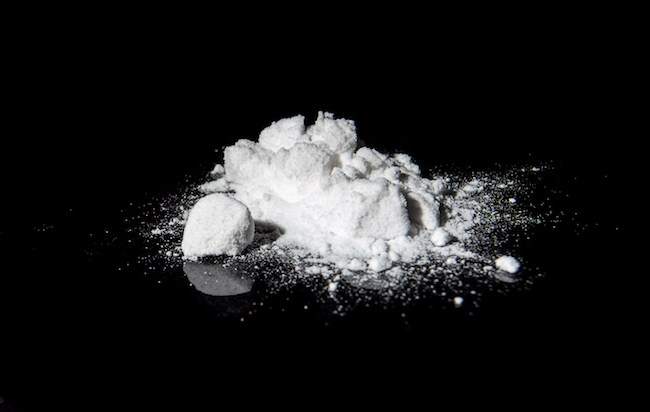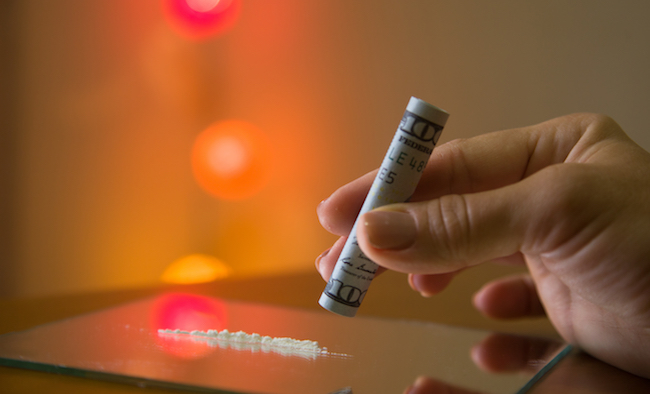
If you’ve ever used cocaine (and if you haven’t you surely know someone who has) you might be familiar with the drug’s mental and physical effects: Your self-confidence booms, your focus is keen, and, if you’ve been drinking, you feel like you can “totally and completely still function.” There’s euphoria too, a zooming rush that thrums with electricity. This all lasts for about 30 minutes, often followed by agitation, mental fuzz, and extreme unease. These feelings lead to either a desire for more coke or, if you’ve done some research on the subject, a grab for opiates or benzodiazepines to relieve some of the anxiety and paranoia.
The National Institute On Drug Abuse reports that, as of 2014, cocaine use is still relatively stable, with about 1.5 million people in the United States (aged 12 or older) reporting that they’ve taken the drug in the past month. But how safe is coke, really? And how addictive is it? And, more importantly, is casual use (once a month or so) all to the good?
We asked a doctor for answers.
Is Casual Cocaine Use Okay?

According to Malcom Thaler, a physician with One Medical Group, there’s really no safety net where cocaine is concerned. “It only takes one time to get a lethal heart arrhythmia or seizure,” Thaler tells us. “It doesn’t matter whether it’s your hundredth time or your first time, it’s just not safe.”
There are two things that are important to note here: First, there’s evidence that using cocaine can lead to a higher risk of sudden death; second, Thaler says that there’s really no way to tell if you’re at risk before something actually happens.
“Obviously if you’re an older gentleman with heart disease and diabetes it’s going to be riskier,” Thaler explains. “But for the average young person who uses it, even if you’ve used it before, that doesn’t guarantee that it’s not going to happen the next time.”
Cocaine has numerous effects on your body — some of which are very dangerous. It speeds up the heart and raises blood pressure while simultaneously constricting blood vessels. This can interrupt the flow of blood to the heart, leading to an unexpected heart attack. Cocaine also constricts blood vessels in the brain, putting anyone who’s using it at risk of both stroke and seizure (even if the person is otherwise healthy).
The physical effects don’t stop there: even casual use of cocaine can affect the gastrointestinal tract and potentially cause unexpected kidney failure. That’s why Thaler cautions so strongly against using the substance. While he’s not going to suggest you use narcotics in general, his stance on cocaine is particularly firm: It’s the one drug he would categorically warn people against using, even casually.
One more thing to consider: the physical problems aren’t the only issue, here. According to Thaler, the heightened blood pressure and heart rate can lead to anxiety, which can, in turn, lead to paranoia, possible tactile hallucinations (the kind where you might feel a bug digging under the skin), and even suicidal ideation. These feelings don’t seem to get better in as soon as the drug wears off, either — instead, the crash can heighten these effects, making the user feel even more despondent (which gets compounded with long-term use).
There’s also a correlation between even the most casual cocaine use and emergency room visits. A 2011 study done by the Department of Health and Human Services reported that 162 out of every 100,000 visits to the emergency room were a result of cocaine use, making it the illicit substance most frequently associated with imperative medical care.
The good news? Trips to the emergency room can be immensely helpful, as the staff there can lower blood pressure and treat any ill effects the substance has on the heart.
Fine, But Is There A Safe Way To Do Cocaine?

According to Thaler, the short answer is “no.” It’s impossible to predict how cocaine will affect you, how “out of it” you will be, making it much harder to remind the casual user to take a break and drink some — but not too much — water (like one might do when taking Molly). “I think this is one drug where I can safely say there’s no guarantee,” Thaler says, “it’s not like there are steps you can take that will mitigate the risk substantially. I don’t think we can go there with cocaine.”
And then there’s this: “The most telling point is that when you look at people who have had horrendous reactions, even life threatening reactions — it doesn’t correlate with the dose they took and it doesn’t correlate with the level of the drug in their blood,” Thaler tells us. “It’s an idiosyncratic thing and you can’t predict it.”
Unpredictability like that is what makes coke so risky.
“The problem is,” Thaler continues, “you don’t know what you’re getting. People also often combine cocaine with other drugs, such as opiates, for a speedball. And your body is different every time you take it, too. If you’re a little under the weather and you’ve got a virus in your body, you can see where that could set you up for something.”
But If You Are Using Cocaine… Can You Make Your Experience Less Dangerous?

If you’re going to use cocaine regardless of the above warnings, there are some ways to (potentially) lower the risks of adverse effects, although they can never be eliminated completely.
First of all, do your best to make sure that you’re getting a drug that hasn’t been cut with harmful substances, such as Levamisole, a cattle de-wormer that’s been associated with some rare, but very unpleasant infections. You can use a cocaine testing kit to check for cocaine purity, as well as a cocaine cuts testing kit to see exactly what other substances — such as ephedrine or ibuprofen — have been added to your supply. This will make it easier to avoid an unpleasant reaction if you live with an allergy to any of the additives.
Second of all, don’t mix your drugs. Not only can it lower your inhibitions — allowing you to use more than you’d thought you might — but certain substances, such as alcohol, can trigger unwanted and possibly unpleasant or dangerous effects that will ruin your high and perhaps your health. Even marijuana, often seen by people as completely harmless, has been shown to raise your heart rate even higher when paired with coke.
Third, don’t reach for more coke or any other substances once the crash hits. Not only can mixing be dangerous, but cocaine, opiates, and benzodiazepines are all highly addictive substances, so even though it seems like a good idea to just do a little more to get rid of the mental fog and depression, it’s better to just sleep it off. The night has to end sometime. You don’t want to tax your body for 36 hours straight (even if you read about Hunter S. Thompson doing it).
Is Drinking Vodka And Red Bull Actually The Same As Snorting Cocaine?

A week ago, the internet exploded with the news that mixing vodka and energy drinks was shown to have similar effects on mice to using cocaine. Many people reverse engineered the logic to conclude, “I’m fine with five vodka-Red Bulls, maybe cocaine isn’t as bad as I thought!”
Dr. Thaler isn’t feeling that. That study was done on adolescent mice, specifically, and revealed that the vodka/energy drink combo could have a significant effect on an adolescent’s brain as it pertains to addiction, not in terms of other physical effects.
“I think it’s safe to say if you’re going to go with either I would go with vodka and caffeine, but I wouldn’t recommend that to anyone either,” Thaler says. “The caffeine blunts the feeling you get of you’ve had enough so you keep drinking. It’s what’s called the alert drunk — you keep going, you keep drinking more.”
“At best that’s going to cause the worst hangover you ever had,” he continues. “At worst, you’ll start engaging in risky behavior because your alcohol level is soaring. And if you keep drinking you can achieve a lethal level of alcohol in your blood and you can die.” But he still thinks another vodka-Red Bull is safer than another bump of coke.







